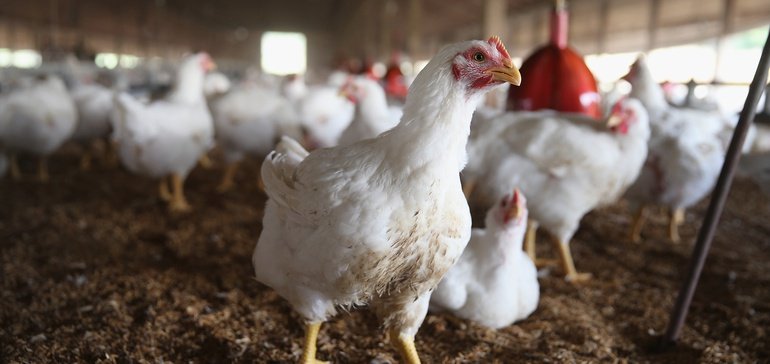Broiler chicken industry points to sustainability gains over past decade

Dive Brief:
- The National Chicken Council, a poultry industry trade group, has released its first U.S. Broiler Chicken Industry Sustainability Report. It found that the industry cut its greenhouse gas emissions per kilogram of bird produced 18% between 2010 and 2020, despite producing 21% more poultry by weight in that same time period. Land and water use fell 13% and fossil fuel consumption dropped 22%.
- The report also highlighted improved animal welfare standards among poultry producers, with on-farm mortality rates for broiler chickens declining 72% since 1925. Access to adequate feed improved and the animals are now less susceptible to disease and predators, and are raised by professionals trained to industry welfare standards, the group said.
- As consumers seek out food from more environmentally conscious sources, the chicken industry has a vested interest in framing its members as sustainable and ethical. The report comes after negative attention poultry producers have received over the past few years and during the pandemic regarding their carbon footprint and animal welfare practices.
Dive Insight:
The meat industry has faced a barrage of criticism in recent years for the sustainability of its operations after reports detailed its heavy contributions to greenhouse gas emissions and fossil fuel use. In 2019, a climate change report from the Intergovernmental Panel on Climate Change, commissioned by the UN, found that if the world population shifted from meat and embraced a more plant-based diet, by 2050 it could reduce global carbon dioxide emissions by up to eight billion tons per year.
Poultry processing companies, who make up the membership of the National Chicken Council, want to build trust with consumers regarding their practices and to keep chicken a staple in their diets. And they’ve been rolling out a series of commitments to turn the conversation positive.
Tyson, the largest broiler chicken producer in the U.S., has made it a priority in recent years to transition to a more sustainable business model. The chicken giant pledged to achieve net-zero carbon emissions by 2050, with a goal of using 50% renewable energy by 2030. In 2015, Perdue Farms pledged to reduce greenhouse gas intensity by 30% by 2023.
The poultry industry has also been criticized for its treatment of animals. When COVID-19 shut down meat processors in the spring of 2020, over 2 million chickens at one plant were killed but not processed for meat, triggering outrage among consumers and animal rights advocates.
Critics have also questioned how the industry raises chickens, arguing that today’s birds are bred for quantity of meat, at the loss of quality of life. White striping disease, a muscular ailment that erodes a chicken’s muscle and increases its fat levels, is now found in 99% of supermarket chickens, according to a report released this week by the Humane League. The animal rights group said it occurs when chickens are bred for rapid growth.
But the poultry industry has also shown itself responsive to negative feedback. After videos of animal cruelty at a Tyson factory surfaced in 2016, the company ending the practice of beak modification on its chickens. Cargill has made commitments to handle its poultry in a low-stress way, and a report from World Animal Protection and Compassion in World Farming found that animal welfare has become “integral” to the company’s business strategy. And last month, CPGs and retailers founded a working group to help other brands meet the Better Chicken Commitment — baseline welfare standards for meat chickens created in 2014 by Compassion in World Farming.
Many consumers have shown they prioritize ethical production of chicken. According to a report from Compassion in World Farming that references Mintel data, 29% of consumers said the most important thing to them when buying chicken is the “humanely raised” label.
For the poultry industry, being responsive to consumers’ concerns and demonstrating its sustainability is key. Many people are looking for more environmentally friendly ways to fulfill their protein needs. In lieu of poultry, some are turning to plant-based chicken, which saw an 18% increase in sales in 2020, according to SPINS data.
Source: fooddive.com

